“Unlock the Power of Moringa Powder: Nature’s Multivitamin enriches your diet with essential nutrients, antioxidants, and vitamins for optimal health and wellness.”
Introduction
In our quest for optimal health and natural supplements, one superfood has emerged as a beacon of nutritional abundance: Moringa powder. Dubbed as “Nature’s Multivitamin,” this green superfood is packed with vitamins, minerals, and antioxidants, offering a plethora of health benefits. In this article, we’ll dive deep into the world of Moringa powder, exploring its benefits, nutritional profile, and how you can incorporate it into your daily routine.
Table of Contents
What is Moringa?
Moringa Oleifera, commonly known simply as Moringa, is a tree native to parts of Africa and Asia. It’s renowned for its nutritional value and has been used in traditional medicine for centuries. The leaves, from which the powder is made, are the most nutrient-rich part of the plant.
The Nutritional Profile of Moringa Powder
Vitamins
- Vitamin A: Moringa powder is rich in vitamin A, which is crucial for maintaining healthy vision, immune function, and skin integrity.
- Vitamin C: With a high vitamin C content, it supports the immune system, helps in the absorption of iron, and possesses antioxidant properties.
- Vitamin E: Known for its antioxidant activity, vitamin E present in Moringa powder helps protect the body from oxidative stress.
Minerals
- Calcium: Moringa powder contains more calcium than milk, gram for gram, which is vital for bone health and muscular function.
- Potassium: High levels of potassium in Moringa powder help to maintain normal blood pressure and heart function.
- Iron: It’s a good source of iron, essential for the formation of hemoglobin and oxygen transport in the body.
- Magnesium: Involved in over 300 enzymatic reactions in the body, magnesium in Moringa powder supports muscle and nerve function and energy production.
Protein
Moringa powder is a rare plant source of all nine essential amino acids, making it a complete protein. This is particularly beneficial for vegetarians and vegans who might find it challenging to get all essential amino acids from plant-based foods.
Antioxidants
Moringa powder is loaded with antioxidants such as quercetin, chlorogenic acid, and beta-carotene. These compounds can help in reducing inflammation and protect against chronic diseases, including heart disease and type 2 diabetes.
Fiber
It also contains a good amount of dietary fiber, which promotes digestive health, helps in maintaining a healthy weight, and prevents constipation.
Other Compounds
Moringa powder is known for its bioactive plant compounds, including polyphenols, which may have anti-inflammatory and protective effects on the body.
Nutritional Breakdown
The specific nutritional content can vary slightly based on the growing conditions, harvesting, and processing methods. However, generally, a tablespoon (approximately 10 grams) of Moringa powder can provide:
- Calories: Around 35 kcal
- Protein: 2-3 grams
- Fat: Less than 1 gram
- Carbohydrates: 6-7 grams
- Fiber: 2-4 grams
- Iron: 1.5-3 mg
- Calcium: 100-200 mg
- Magnesium: 30-50 mg
- Potassium: 250-300 mg
- Vitamin A: 500-750 mcg
- Vitamin C: 7-10 mg
Given its rich nutritional profile, Moringa powder can be an excellent supplement for individuals looking to boost their nutrient intake naturally. It’s versatile enough to be added to smoothies, soups, and salads, or even used as a green supplement in baking, making it an easy addition to any dietary routine.
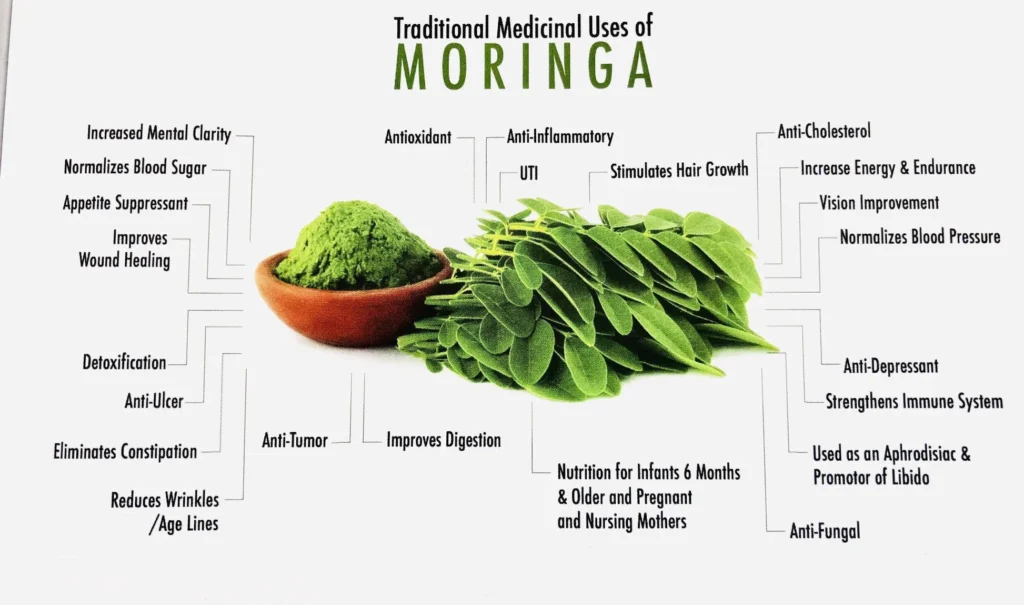
Health Benefits of Moringa Powder
1. Rich in Antioxidants
Moringa powder is loaded with antioxidants like quercetin, chlorogenic acid, and beta-carotene. These compounds help combat oxidative stress by neutralizing free radicals, which can lead to chronic diseases such as heart disease and type 2 diabetes.
2. Boosts Immune System
The high levels of vitamin C and beta-carotene in Moringa powder enhance the immune system’s defense mechanisms, making the body more resistant to infections and diseases.
3. Supports Healthy Skin and Hair
Moringa powder’s high content of vitamins A and E, as well as antioxidants, contribute to the maintenance of healthy skin and hair. Vitamin A is essential for cell growth and the maintenance of healthy skin, while vitamin E protects against oxidative stress, promoting skin health and preventing hair loss.
4. Anti-inflammatory Properties
The isothiocyanates found in Moringa powder are known for their anti-inflammatory properties. Chronic inflammation is associated with numerous health conditions, including heart disease, cancer, and arthritis. By reducing inflammation, Moringa powder can help protect against these conditions.
5. Improves Digestive Health
Moringa powder is a good source of fiber, which aids in digestion and helps prevent constipation. Fiber can also promote a feeling of fullness, contributing to weight management efforts.

6. Lowers Blood Sugar Levels
Several studies have shown that Moringa oleifera can help lower blood sugar levels, making it beneficial for people with diabetes. Its chlorogenic acid content may help moderate blood sugar levels after meals.
7. Supports Heart Health
Moringa powder may have beneficial effects on heart health. It has been found to lower cholesterol levels, reducing the risk of heart disease. Additionally, its antioxidant properties help keep the heart functioning optimally by preventing the oxidation of cholesterol in the blood.
8. Enhances Brain Health
The antioxidants and neuro-enhancer activities of Moringa powder may help improve brain health. It’s been suggested that Moringa could support cognitive functions and may have potential as a treatment for Alzheimer’s disease due to its antioxidant and neuroprotective effects.
9. Rich Source of Plant-Based Protein
Moringa powder provides a complete protein source, containing all nine essential amino acids. This makes it an excellent supplement for vegetarians and vegans or anyone looking to increase their protein intake from plant-based sources.
10. Bone Health
The calcium and phosphorus in Moringa powder help keep bones healthy and strong. Additionally, its anti-inflammatory properties may be beneficial in treating conditions like arthritis and may help prevent bone loss.
11. Detoxification
Moringa powder has natural detoxifying properties, which can help cleanse the body of toxins. Its ability to purify water is indicative of its potential to aid in detoxifying the human body as wel
How to Use Moringa Powder
1. Add to Smoothies
One of the simplest ways to use Moringa powder is by adding it to smoothies. Its nutrient-dense profile can boost the nutritional value of your drink. A teaspoon or two can easily be blended into your favorite smoothie recipes without significantly altering the taste.
2. Mix into Juices
If you’re not into smoothies, you can stir Moringa powder into your favorite fruit or vegetable juice. This is an easy way to enrich your drinks with vitamins, minerals, and antioxidants.
3. Stir into Yogurt or Oatmeal
For a nutritious breakfast, mix a teaspoon of Moringa powder into your yogurt or oatmeal. It pairs well with both sweet and savory flavors, making it a versatile addition to your morning routine.
4. Use in Soups and Stews
Moringa powder can be easily incorporated into soups and stews. Add it towards the end of cooking to retain most of its nutrients. It not only thickens your soups and stews but also adds a healthful boost.
5. Bake into Goods
Moringa powder can be used in baking as well. Substitute a small portion of flour with Moringa powder in your recipes for bread, muffins, or pancakes. This not only adds nutrients but also gives your baked goods a lovely green hue.
6. Sprinkle Over Salads
Sprinkle Moringa powder over your salad for an extra dose of nutrition. Its subtle flavor won’t overpower the taste of your salad but will enhance its nutritional profile.
7. Blend into Salad Dressings
You can also incorporate Moringa powder into homemade salad dressings. Whether it’s a vinaigrette or a creamy dressing, Moringa can add a healthful twist to your salads.
8. Make a Moringa Latte
For a nutritious alternative to coffee, try making a Moringa latte. Heat your choice of milk, whisk in a teaspoon of Moringa powder and sweeten it with honey or maple syrup for a healthy, energizing drink.
9. Enrich Sauces and Dips
Moringa powder can be mixed into sauces and dips. Adding it to pesto, hummus, or guacamole can significantly boost their nutritional value without compromising taste.
10. Tea
Simply whisk Moringa powder into hot water to make a soothing herbal tea. Add lemon, honey, or ginger for additional flavor.
Tips for Using Moringa Powder
- Start with Small Amounts: If you’re new to Moringa, start with a small amount (about half a teaspoon) to see how your body reacts before gradually increasing to 1-2 teaspoons a day.
- Storage: Keep Moringa powder in a cool, dry place away from direct sunlight to maintain its nutritional potency.
- Quality Matters: Choose high-quality, organic Moringa powder to ensure it’s free from contaminants and retains its nutritional benefits.

Choosing the Right Moringa Powder
1. Organic Certification
Opt for Moringa powder that is certified organic. Organic certification ensures that the Moringa trees were grown without the use of synthetic pesticides, fertilizers, and other harmful chemicals. This not only supports your health but also the environment.
2. Source
The origin of the Moringa powder is important. Moringa powder sourced from its native regions (Africa, India, and Southeast Asia) is often of higher quality because the trees grow in optimal conditions. Products that provide transparent information about their sourcing are generally more reliable.
3. Processing Method
The method used to process Moringa leaves into powder can significantly affect its nutritional value. Look for brands that use low-temperature drying processes to preserve the maximum amount of nutrients. Avoid products that use high heat, which can destroy sensitive vitamins and antioxidants.
4. Purity
High-quality Moringa powder should be pure, containing only Moringa leaves without fillers or additives. Check the ingredients list to ensure you’re getting 100% Moringa leaf powder.
5. Color and Taste
The color and taste of the Moringa powder can indicate its quality. Fresh, high-quality Moringa powder should have a vibrant green color and a slightly earthy taste. A dull color or an off taste can indicate poor processing or that the powder is past its prime.
6. Packaging
Good packaging is essential to protect Moringa powder from light, air, and moisture, all of which can degrade its quality. Look for packaging that is resealable and made from materials that offer a good barrier against these elements. Some companies use dark glass or opaque, food-grade plastic containers to preserve the powder’s nutritional integrity.
7. Reviews and Recommendations
Before making a purchase, read customer reviews and seek recommendations. Feedback from other consumers can provide insight into the effectiveness and quality of the product. However, be discerning, as reviews can be manipulated. Trusted health food bloggers or nutritionists can also be good sources for recommendations.
8. Certifications and Testing
Check if the brand has any quality certifications, such as ISO (International Organization for Standardization) or GMP (Good Manufacturing Practices), which indicate that the product meets high-quality standards. Some companies also test their products for heavy metals and contaminants, providing an extra layer of assurance.
9. Price
While price shouldn’t be the sole determining factor, it’s worth considering. Extremely low-priced Moringa powder may be an indicator of poor quality or unethical production practices. Invest in a product that balances quality with cost-effectiveness.
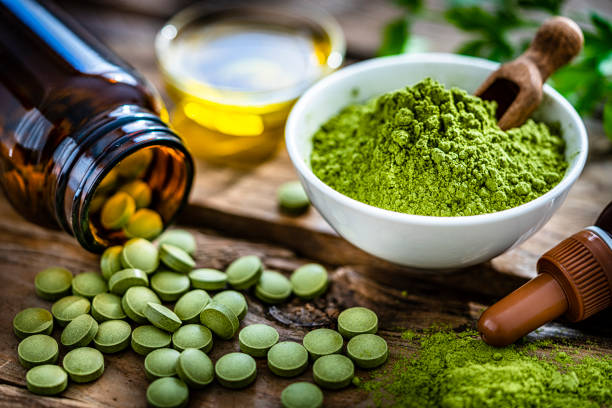
Source to Get Organic Moringa Leaf Powder Capsules
Conclusion
Moringa powder is a versatile and potent superfood that can enhance your health in many ways. By understanding its benefits and how to use it, you can easily incorporate this “Nature’s Multivitamin” into your daily regimen.
FAQs
- Is Moringa powder safe for everyone? While Moringa powder is generally safe, individuals with specific health conditions should consult a healthcare provider before use.
- Can Moringa powder be used in cooking? Yes, Moringa powder can be added to various recipes, including soups, stews, and sauces, to boost their nutritional value.
- How much Moringa powder should I take daily? It’s recommended to start with one teaspoon per day and gradually increase to two teaspoons, based on your body’s reaction.
- Does Moringa powder have any side effects? In rare cases, consuming large amounts of Moringa powder may lead to gastrointestinal discomfort. It’s best to start with small amounts and increase gradually.
- Can Moringa powder help with specific health conditions? While Moringa powder is known for its general health benefits, it’s always best to consult with a healthcare professional for advice on specific health conditions.
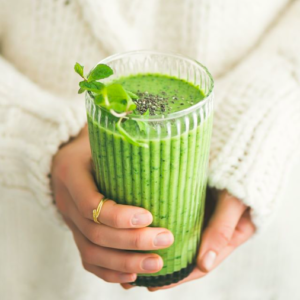








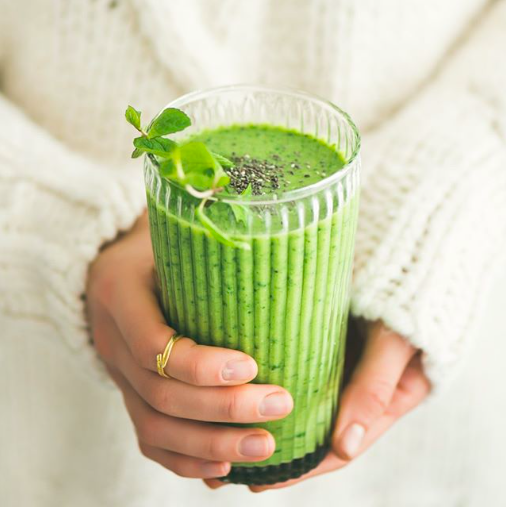
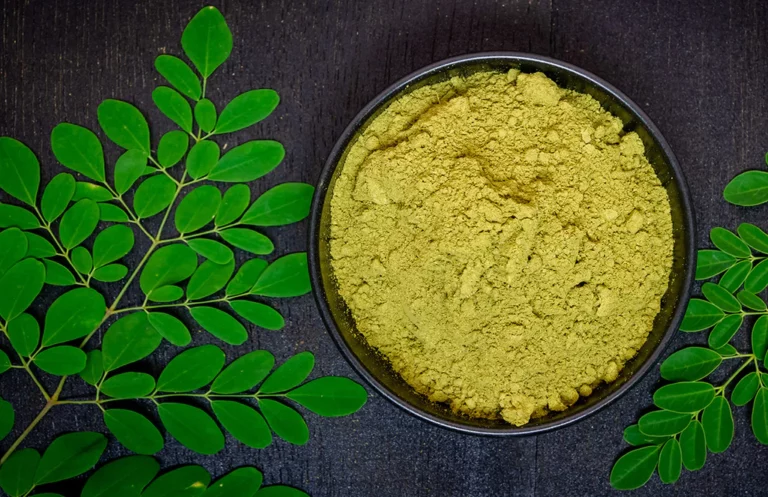







+ There are no comments
Add yours